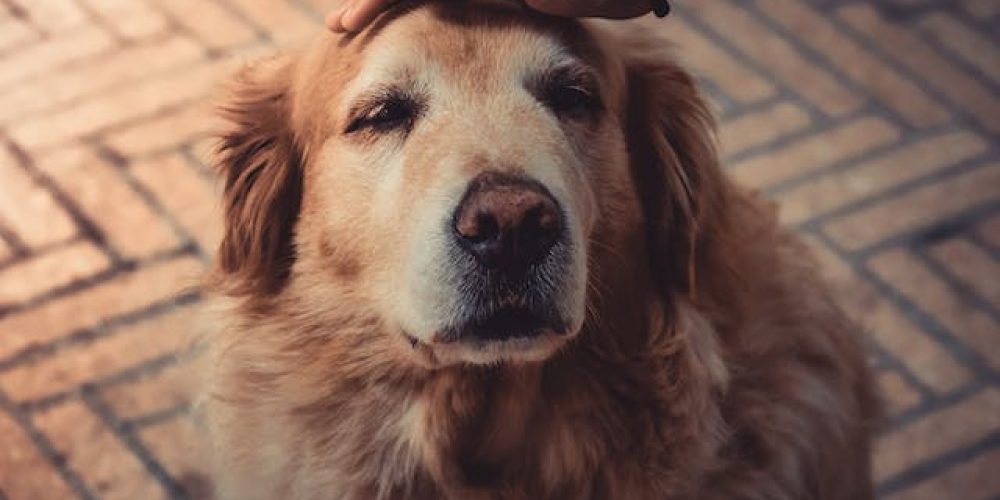This guide helps provide information on some of the most common conditions in senior dogs, how to recognise the symptoms, and what treatment is available.
What are the most common medical problems for senior dogs?
Dogs enter their senior years between the ages of 6 and 10 years old, depending on their breed. Smaller breed dogs tend to have a longer lifespan than larger breed dogs, but there are some exceptions to this. Taking all dog breeds into consideration, the average life expectancy in the UK is 11.2 years.
Arthritis
Arthritis is an extremely common problem in senior dogs, present in up to 80% of dogs over 8 years of age. It is an inflammatory condition that affects the joints and causes irreversible damage.
- Symptoms of arthritis include stiffness, slowing down on walks, reluctance to jump or climb stairs, limping, and pacing at night.
- The diagnosis of arthritis involves a full physical examination and, ideally, imaging, such as x-rays.
- Arthritis in dogs cannot be cured, but it can be managed with pain medication, special nutrition, joint supplements, weight control, and lifestyle changes.
- Click here to read more about arthritis in dogs. This article includes a handy questionnaire that can help determine if your dog has signs of arthritis.
Lumps
Senior dogs are more prone to developing lumps than younger dogs. These lumps are most commonly fatty tissue, warts, or benign growths. However, there are some lumps that can be malignant. If your dog develops a lump that is rapidly growing, painful, or has discharge from it (including blood), then try to speak with a vet as soon as possible.
- To diagnose what type the lump is, your vet will take a sample of the tissue to examine the cells inside it. This can be done by a needle aspirate, biopsy, or removing the whole lump.
- Your vet may advise you to monitor lumps such as lipomas (fatty lumps), cysts, or benign lumps if they are small and not causing any pain. For fast-growing, larger, or malignant lumps, your vet will most likely recommend surgical removal. Chemotherapy and radiotherapy are also available for dogs that have certain types of cancer.
- Our article on lumps in dogs has lots of useful information for pet owners.
Dental problems
Dental problems such as infections or abscesses, tooth loss, and periodontal disease are very common in older dogs. Dogs over 12 years old are almost four times more likely to develop dental disease than younger dogs. Proper dental care is extremely important for senior dogs. Although they do not show it, your dog may be in a lot of pain.
- Certain breeds of dogs are more susceptible to dental disease, including Cavalier King Charles Spaniels, Toy Poodles, and Greyhounds.
- Symptoms of dental disease include bad breath, losing weight, chewing on one side, and facial swellings.
- If your dog has dental problems, your vet will most likely recommend dental work under general anaesthesia. This usually involves dental x-rays, any necessary extractions, and cleaning the teeth. There are also specialist dental vets for more complicated procedures.
- It’s important to get your dog checked regularly for dental disease. If left untreated, it can lead to more serious problems in the heart, lungs, and kidneys.
Heart problems
There are different types of heart disease that dogs can develop. Heart disease in dogs is sadly not curable, but it can often be well managed to give them a good quality of life.
- Symptoms of heart disease include getting tired more quickly, coughing, fainting, and laboured breathing.
- Vets usually diagnose heart problems using a combination of blood tests, x-rays, an ECG, and a heart scan.
- There are many medications available for treating heart disease in dogs. Your vet will advise on what is best for your dog depending on their symptoms, type of heart problem, and if there are any complications of the condition, such as high blood pressure.
- Our article about heart problems in dogs goes into more detail about what to expect with heart disease.
Gastrointestinal disease
Vomiting and diarrhoea in senior dogs can be a sign that there is a problem in the digestive system itself, but also a problem elsewhere in the body, such as kidney disease.
- Mild cases of tummy upsets should pass within 24-48 hours. Vomiting or diarrhoea going on for longer than this or associated with other symptoms like weight loss or drinking more than normal may indicate that there are underlying problems.
Dementia
Dogs can develop a condition that is similar to Alzheimer’s in humans. Around 50% of dogs over 12 years old have symptoms of dementia. Unfortunately, this is not a curable condition, but medication from your vet can help slow the progression of the disease.
- Symptoms of dementia in dogs include accidents in the house, pacing, confusion, staring into space, and becoming less playful.
- There is no diagnostic test for dementia in dogs; vets usually suspect it based on the symptoms and ruling out other conditions.
- There are prescription medications, supplements, food, and lifestyle changes that can help support dogs with dementia.
- Find out more in our article about dementia in dogs.

There are many other health conditions or challenges that can affect senior dogs. Read more about these challenges and what to look out for in our caring for your senior dog article.
Download the app and call us now if you have any questions.
Our Joii vets are available 24 hours a day for advice.











